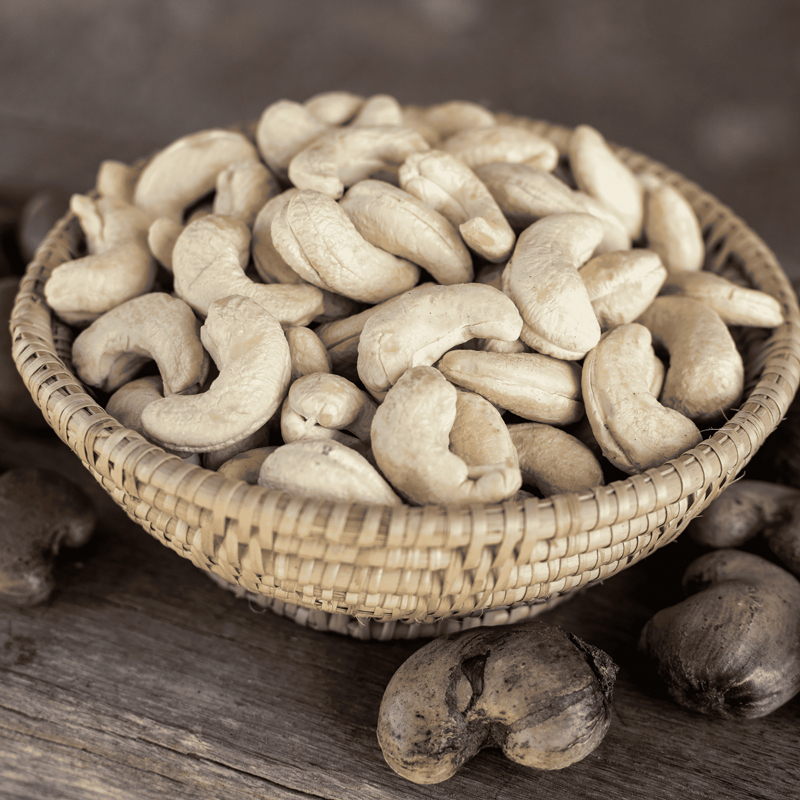
Building a Sustainable Cashew Sector in West Africa Through Data and Collaboration
Africa is a leading producer of raw cashew nuts (RCNs), accounting for a significant portion of global production. In 2023, West Africa’s cashew harvest reached a record-breaking 3 million tons, marking a 15% increase from the previous year. Côte d’Ivoire stands out as the world’s top producer, with a crop of approximately 1.2 million metric tons. Other major producers in the region include Nigeria, Ghana, and Benin.
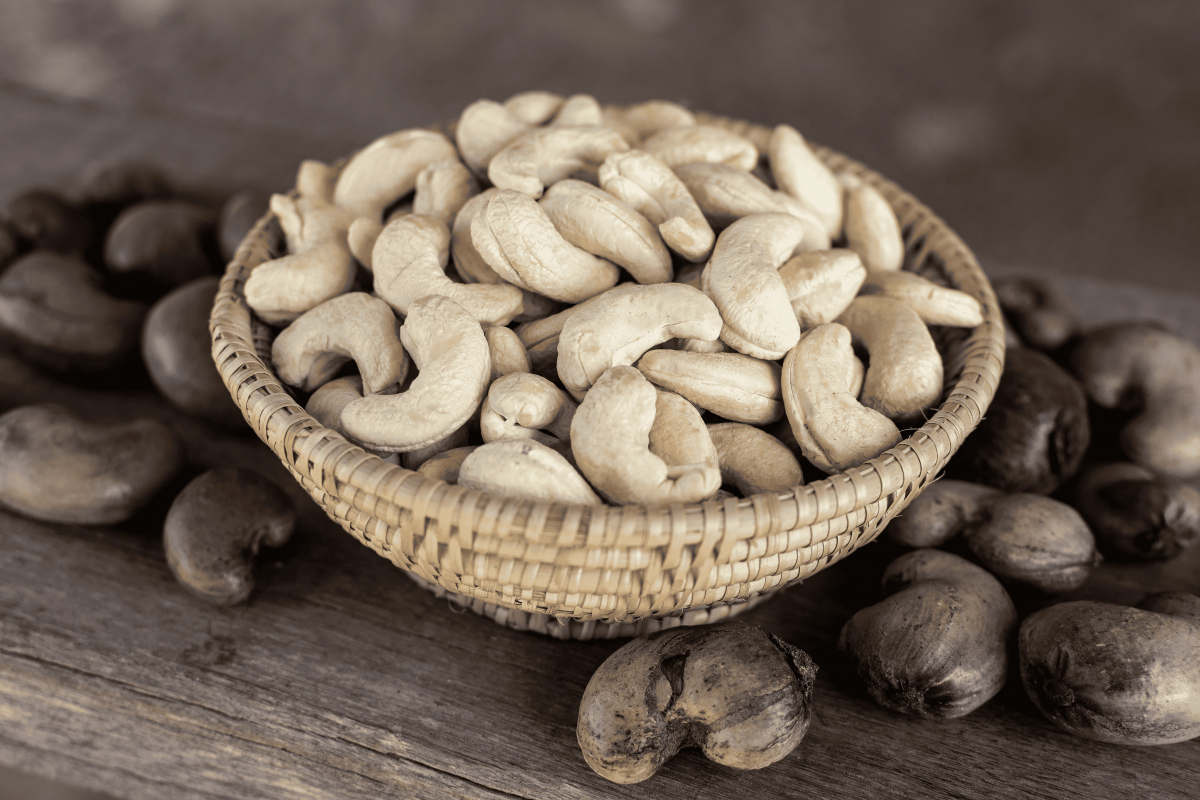
Cashew farming in West Africa is predominantly carried out by smallholder farmers, with over 2 million farmers contributing to more than 30% of the global supply. The profitability of cashew farming varies based on factors such as market information, yield, market access, and global prices.
As part of the United States Department of Agriculture (USDA)’s Food for Progress PRO-Cashew project for West Africa, Development Gateway: An IREX Venture (DG) collaborated with Cultivating New Frontiers in Agriculture (CNFA) to develop a data collection and analysis platform. This platform aims to enhance cashew productivity and competitiveness by supporting informed decision-making across the value chain in Côte d’Ivoire, Benin, Burkina Faso, Ghana, and Nigeria. Informed decision-making can help gain higher productivity through increased yields per hectare and reduced post-harvest losses, improve competitiveness through high-quality cashews meeting global standards, and help create more jobs.
The project came to an end in August 2024 after four years of working with government agencies, producers, traders, processors, and development partners in the five implementing countries to co-create an online tool aimed to inform, support, promote, and strengthen Africa’s cashew industry.
This blog outlines some of the key project highlights, including some of the challenges we faced, lessons learned, success stories, and identified opportunities for a more competitive cashew sector in West Africa.
Building the Cashew-IN Platform
PRO-Cashew aims to address the underlying issues of competitiveness in West Africa’s cashew sector, the inconsistent cooperation amongst regional policymakers, and the resulting trade impediments. The project identified, prioritized, and implemented strategic activities at different points of the cashew value chain to meet the unfulfilled needs of the target group beneficiaries more effectively. To incentivize, strengthen, and empower cashew value chain actors with actionable data, CNFA and DG designed a cashew data collection and analysis system (Cashew-IN) to expand and improve existing data-sharing systems focused on cashew production, trade, and processing levels.
Cashew-IN aims to make data easier to use for better decisions and improved outcomes in the cashew market. To support these objectives, DG used its Custom Assessment Landscape Methodology (CALM) to identify gaps in existing data collection, storage, and analytical tools in the cashew sector, as well as key decisions and target “use cases” for the future users of Cashew-IN. These learnings guided the design of Cashew-IN, a platform that addresses production, processing, and trade themes through a suite of visual tools configured to monitor and track associated indicators.
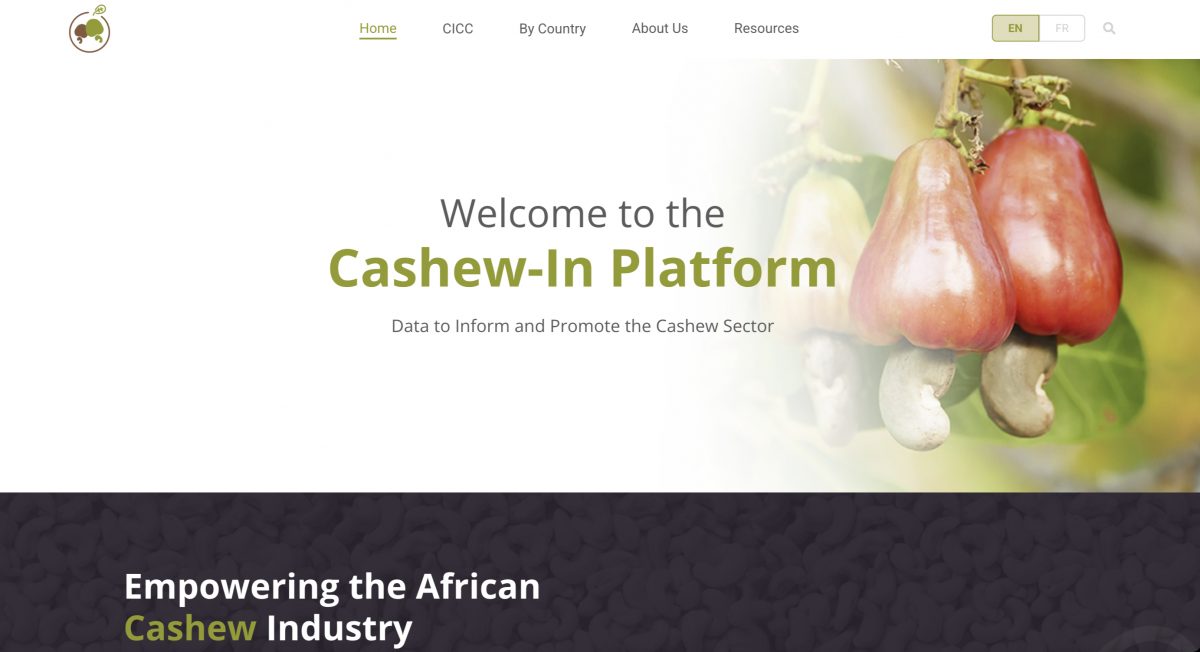
The Cashew-IN web application includes a user interface powered by WordPress, a user-friendly and intuitive software. It extracts its information from the embedded database configured to accommodate data starting from 2015 onwards. The data and information are entered by officially designated focal points by country. The Cashew-IN platform includes i) a regional dashboard managed by the International Cashew Council (CICC) and ii) country dashboards managed by an officially designated country administrator.
Sustainability Plan
As the Cashew-IN platform is regional in scope, DG has identified the International Cashew Advisory Council (CICC), an intergovernmental organization promoting cashew value chains, as a sustainability partner. The CICC comprises 11 countries, including the five Cashew-IN countries, and is decentralized at the level of each member country, with focal points per country from the cashew sector’s regulatory bodies or, failing that, the Ministry of Agriculture. CICC was selected to coordinate the operation of the Cashew-IN platform at regional and country levels through systematic and continuous data collection efforts leading to exhaustive and reliable data likely to inform decisions for a more competitive cashew sector.
To support ownership and sustainability at the country level, DG worked with national stakeholders from government institutions, producer associations, and the private sector to set up national committees responsible for managing their own version of the Cashew-IN platform in compliance with their laws and regulations governing data collection, ownership, and publication.
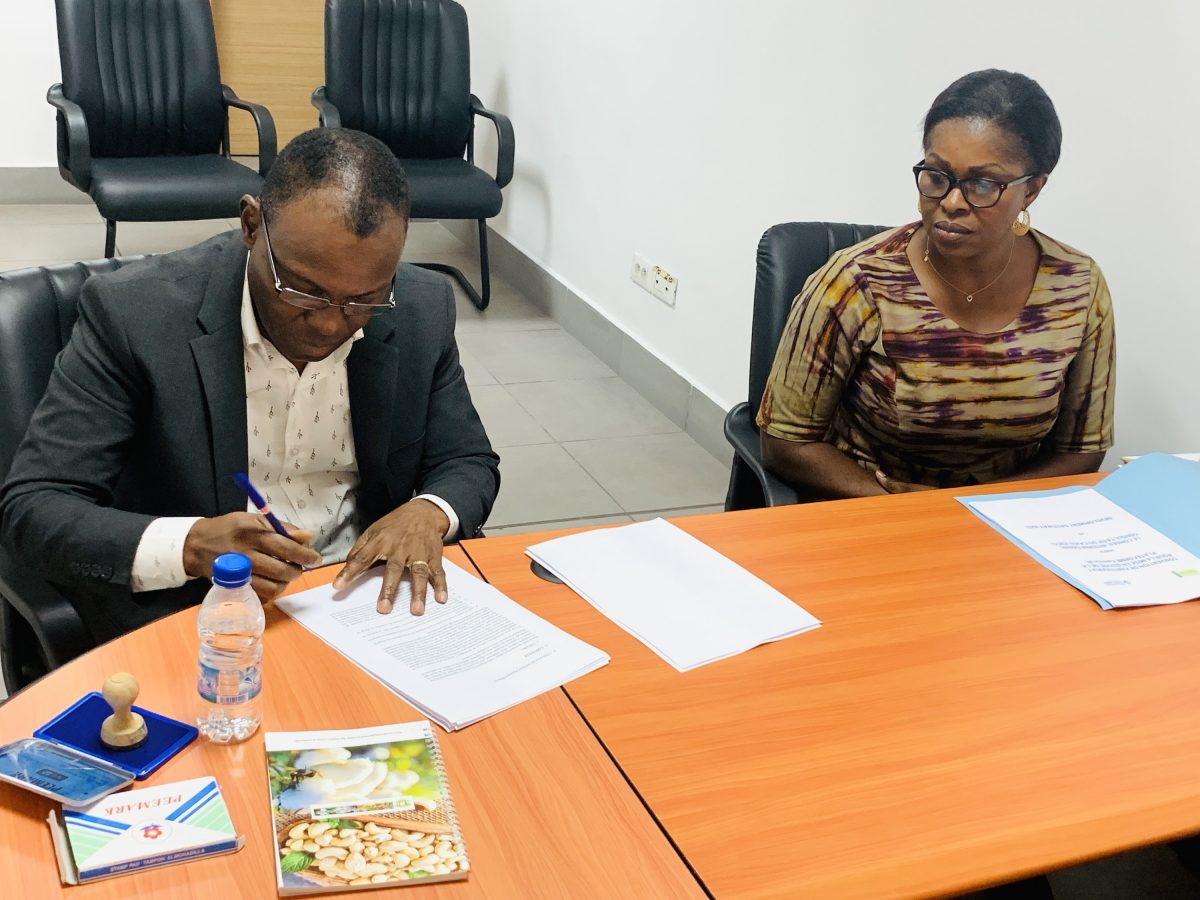
Lessons Learned & Stories of Change
First, the importance of data security and compliance with the countries’ data frameworks. One of the country’s Ministry of Agriculture was quite reluctant after the platform was first introduced, mainly because of data management and confidentiality concerns that emerged from a bad experience with a former partner. Understanding that Cashew-IN will be adapted to their national framework on data disclosure and that data will remain the property of the source helped alleviate their concerns and encouraged their involvement. The Ministry of Agriculture spontaneously joined the steering committee group.
Secondly, engaging and empowering national partners from the project assessment phase onwards – in line with the DG’s collaborative approach – facilitated the platform’s technical development and their buy-in and commitment. During the project’s closing workshop, one country’s representatives announced, as part of their ownership and sustainability strategies, the upcoming recruitment of an IT specialist who will be specifically dedicated to managing the Cashew-IN platform.
During the project’s closing workshop, one country’s representatives announced, as part of their ownership and sustainability strategies, the upcoming recruitment of an IT specialist who will be specifically dedicated to managing the Cashew-IN platform.
Finally, at the regional level, the CICC has taken ownership of the platform by providing two IT staff who have been trained to manage, update, and use the platform as well as adding new features. The Executive Director of the CICC also announced a plan to include other CICC member countries that are not involved in the Pro-Cashew-In programme and create a consultative committee made up of the three CICC technical committees (Production, Research, and Processing).
Appropriation and Capacity Building
DG conducted several sessions on platform use and management, data upload and configuration as well as maintenance of the platform. 56 country administrators and focal points of data-holding organizations from Benin, Burkina Faso, Nigeria, and the CICC have been trained to manage and use the Cashew-IN platform. 12 IT specialists from the same countries have also been trained to get familiar with the technologies used in the Cashew-IN platform, enabling them to support its development at the end of the project implementation. Following the technical training, the source code was shared with the IT specialists for exploration and modification.
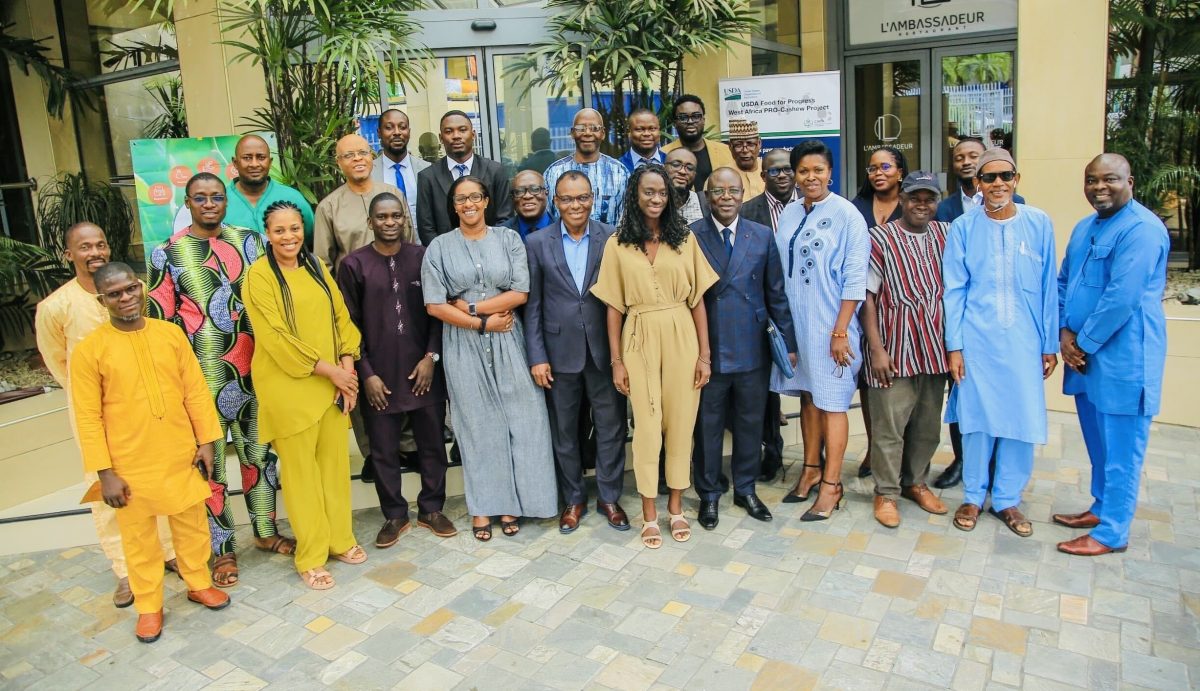
Recommendations
To ensure greater ownership and sustainability of the platform and a significant impact on stakeholders (decision makers, producers, traders, processors, and academics), we recommend the following actions :
- Institutionalization of the platform with a view to systematizing data collection and updating the platform;
- Use of the platform as a reference for decisions taken in the cashew nut sector at both political and private sector levels;
- Involvement of trained stakeholders (IT specialists and focal points) in the maintenance and ongoing technical development of the platform;
- The gradual integration of other CICC member countries into the platform for better regional coverage.
What Comes Next
A few cashew-producing countries that were not included in the Pro-Cashew project expressed interest in joining the initiative (Mali, Senegal, Cameroon, Togo, etc.), an idea also supported by CICC, which expressed its interest in including other cashew-producing countries in the region.
From the program, we confirmed the necessity for DG to work closely with its partners to deliver outcomes that are both useful and meaningful. This project also revealed the importance of local capacity-building to manage the tool even after the project came to an end in August 2024.
Developing a digital solution can be a challenge, but including the beneficiaries from the onset and working closely with them throughout the project implementation has proven to be efficient as well as rewarding for the DG team.